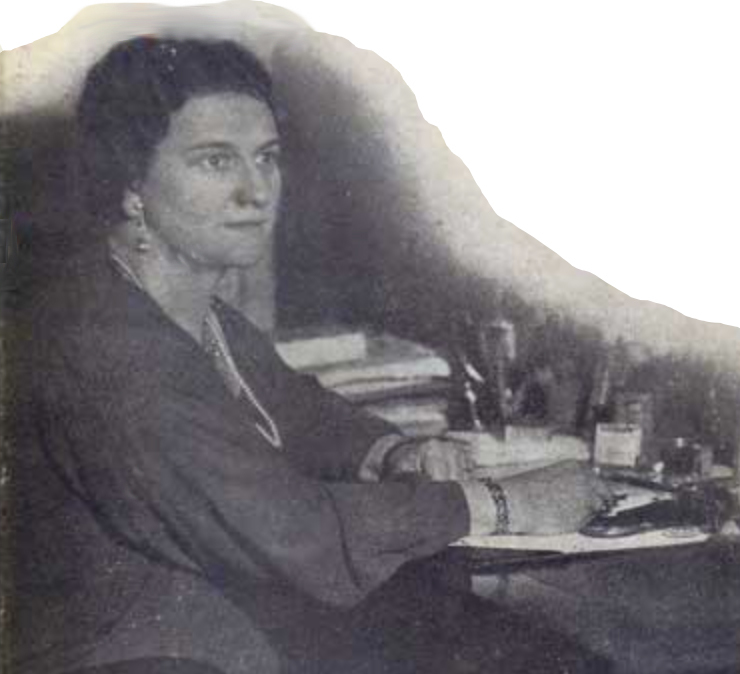Introduction : Overview
The title of this exhibit comes from the writer Frances Parkinson Keyes’s 1962 collection of short stories, The Restless Lady, and Other Stories. Writing was Keyes’s lifework. As a child living in Vermont and Boston, she wrote stories, plays, and poetry. While raising three sons on a New Hampshire farm, she wrote historical narratives about the lives of her forebears. When she learned in 1918 that her first novel, The Old Gray Homestead, was accepted by the prominent Boston publisher Houghton Mifflin, Keyes pledged to herself that she would look at her writing as both a trade and a trust and that she would never write only for money, no matter how much she needed it, and her writings would never be “shabby or scandalous” or “inaccurate or unfair or unkind.” [1]
After moving with her family to Washington, D.C. Keyes began publishing a monthly column, “Letters of a Senator’s Wife,” in Good Housekeeping and her short stories, including those collected in The Restless Lady, appeared in the Delineator. She also continued writing novels and, by the late 1930s, was publishing about a book a year. In the 1950s, she began rotating the locations of her novels; one year she would bring out a book set in New England and the next year it would be Louisiana. Also in the rotation were European settings and subjects, including studies of Catholic saints. Keyes rotated her life like her books, spending her summer months in New England, winters in New Orleans, and the rest of the time traveling. She was a collector of experiences, ideas, people, things, and houses. She was a restless lady.
Keyes arrived in the nation’s capital at a historically important moment in American women’s history. The First World War was over, the final push for woman suffrage was underway, and women were seeking to enlarge their political influence. Keyes was soon at the center of things, as a political journalist, an activist testifying before Congress, and a supporter of other women seeking to leverage the vote on behalf of a progressive political agenda. This exhibit investigates Keyes’s political influence by asking how her writings, especially those in Good Housekeeping magazine, contributed to the political culture of the immediate post-suffrage era. Our examination of the documents leads us to conclude that Keyes’s monthly column, “Letters of a Senator’s Wife,” helped inform American women about important political issues of the day.
Keyes led a big life but scholars have ignored her writings and her life story is not included in histories of New England or narratives of women’s political activism. This exhibit attempts a corrective to such absences by providing background on Keyes’s family, a description of her writing career, an analysis of her political journalism and activism in the 1920s and 1930s, and an examination of Keyes’s efforts in the field of historical preservation.
Collaboration was crucial to Keyes’ success as a writer. She relied on knowledgeable individuals to help her with research and employed secretaries (and drafted her sons) to meet publishing demands. We have taken a lesson from Keyes with this essay and exhibit, which is a collaborative effort that began in a Spring 2014 seminar under the guidance of Melanie Gustafson of the Department of History and Hope Greenberg of the Center for Teaching and Learning.
The students in that seminar – Rachel Alberico, Caitlin Blake, Marissa Bucci, Margo Butler, Gerard Colby, Kathleen Doyle, Alexander Ellis, Kassandra LaPrade Seuthe, Ashlee Payne, and Catherine Rayner -- did research in the extremely rich Frances Parkinson Keyes Papers at UVM’s Special Collections, studied Keyes’s two memoirs, Roses in December (1960) and All Flags Flying (1972), examined newspaper reports and published interviews about Keyes and magazine articles by Keyes, and read relevant secondary sources. The essays that introduce the documents were written individually by the students and then revised through a collaborative effort.
Thousands of documents in the Frances Parkinson Keyes Collection at UVM’s Special Collections were examined and over four hundred were uploaded in preparation for this exhibit. Only a small selection is included in this exhibit. Our hope is that readers will find the essays and accompanying documents compelling enough to continue reading about the life and times of Frances Parkinson Keyes.
Notes:
1) All Flags Flying, 102-103. ↵

